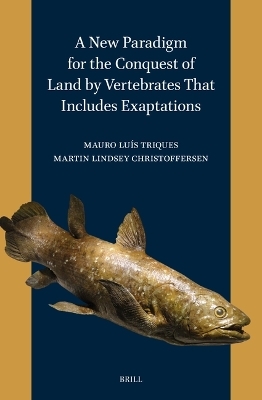
A New Paradigm for the Conquest of Land by Vertebrates That Includes Exaptations
Brill (Verlag)
978-90-04-68475-1 (ISBN)
Mauro Luís Triques, Ph.D. (1994), is Associate Professor at Federal University of Minas Gerais, Brazil. He has published 27 scientific papers, mainly on Neotropical freshwater-fish systematics, including phylogenies. Currently, he focuses his work on the theory of biological evolution, strengthening a pluralistic outlook. Recently, he authored the popular science book Exaptação! Uma via paralela da evolução biológica (sgdz, 2021). Martin Lindsey Christoffersen, Ph.D. (1980), is Full Professor at Federal University of Paraíba, Brazil. He has published over 300 scientific papers (articles, book chapters, and books), focusing on macroevolutionary theory, invertebrate systematics, metazoan phylogeny, philosophy of science, science education, and biodiversity.
Preface
Acknowledgements
List of Illustrations
Notes for Reading This book
1 Phylogenetic Systematics or Cladistics, Introductory Information
1 From Darwin to Hennig
2 Which Animals Are We Dealing With?
3 The Skeleton
2 Adaptive Scenarios
3 Adaptationism, Microevolution, Macroevolution, and Exaptation
4 Monophyly and Geological Time as Counter-arguments to the Adaptationist View of the Origin of Terrestrial Vertebrates
1 Monophyly of Terrestrial Vertebrates
2 The Geologic Time Gap
3 The Extreme Diversity of the Actinopterygii
4 The Phyletic Nature of †Placoderms and †Acanthodians
5 Method Based on Cladistics: New Perspectives
1 Criticisms of Adaptationism
2 Characters
3 Life Styles
4 The Issue of Topology
5 The Origins of Limbs with Digits, Walking, and Terrestriality
6 Recent Phylogenies of Basal Tetrapoda Reveal an Additional Argument
7 Exaptation: Misunderstandings of the Concept
8 Complementary Considerations
6 Geological Time, Morphology, and Ecology
1 Characters
2 Abrupt Appearance of Several Characters
3 Evolutionary Space for Independent New Invasions of Land by Vertebrates after the Devonian
7 Absence of Correlation among Characters and Asynchrony in Their Origins as Additional Arguments
8 Synergy among Arguments and Summary Considerations of the Main Arguments
9 Exaptations, Not Preadaptations, at the Origin of Terrestriality in Vertebrates
10 Science and Its Limits
1 A Statement on Scientific Paradigms
2 A View on the Sociology of Science
3 Epilogue
Glossary
References
Index
| Erscheinungsdatum | 19.12.2023 |
|---|---|
| Verlagsort | Leiden |
| Sprache | englisch |
| Maße | 155 x 235 mm |
| Gewicht | 575 g |
| Themenwelt | Naturwissenschaften ► Biologie ► Botanik |
| Naturwissenschaften ► Geowissenschaften ► Mineralogie / Paläontologie | |
| ISBN-10 | 90-04-68475-1 / 9004684751 |
| ISBN-13 | 978-90-04-68475-1 / 9789004684751 |
| Zustand | Neuware |
| Informationen gemäß Produktsicherheitsverordnung (GPSR) | |
| Haben Sie eine Frage zum Produkt? |
aus dem Bereich


